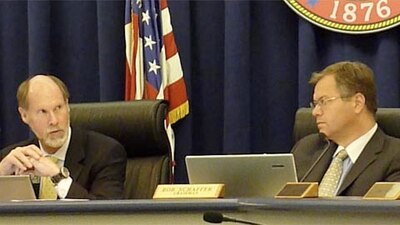The State Board of Education Monday unanimously approved requirements for a new state testing system, meeting the deadline set for it in the 2008 Colorado Achievement Plan for Kids law.

The board also voted unanimously to hire Hazard, Young, Attea and Associates of Rosemont, Ill., to help conduct the search for a successor to Commissioner Dwight Jones.
Key elements of the testing system include:
• More systematic use of formative and interim tests in every grade, which would be done by districts and which would not be used for accountability.
• Assessments of students in preschool through second grade to track their readiness.
• End-of-year assessments, similar to the current CSAP, in grades 3-11 in language arts and math. (Testing in the 11th grade would be new.)
• High school juniors also would continue to take a college admissions exam, such as the ACT test given now.
• Annual test results will be included on student transcripts and report cards.
• Social studies would join science as a test given at least once in elementary school, middle school and high school.
• All students would have individual career and academic plans starting in the 8th grade.
• Students and families also would have access to a online “dashboard” that they could use to track their progress toward “postsecondary and workforce readiness.”
That concept, abbreviated in education jargon as “PWR,’ is the central concept behind the CAP4K law. The ideal is that every Colorado student should graduate from high school ready to attend college or go to work without the need for remedial education.
The document also envisions test results being available by the end of the school year and the use of online testing.
While adoption of the testing framework is a major milestone in the CAP4K timetable, much remains to be done before any new testing system becomes standard in Colorado classrooms. The framework adopted by the board needs to be expanded into a detailed request for proposals on which testing companies can bid. (More information on testing revision, including link to document adopted by board.)
More important, the state needs to figure out how to pay for new tests. Variations of the phrase “when fiscally possible” appear through the document adopted Monday. And expansion of the testing system to include social studies may raise eyebrows in the legislature.
In any event, education officials expect it will be at least four years before any new testing system is implemented.
Last week, the board and the Colorado Commission on Higher Education adopted a less-detailed document that set out the broader “attributes” behind a new testing system. That joint action also was required by the CAP4K law (see story).
Search firm selected
After conducting interviews with representatives of each firm Monday afternoon, the board chose the Hazard firm over Ray and Associates of Cedar Rapids, Iowa, and McPherson and Jacobson of Omaha, Neb., the firm that found Jones for the superintendent’s job in Las Vegas.
Hazard, which ran the searches that led to the hiring of past DPS superintendents Michael Bennet and Jerry Wartgow, bid $29,500 and estimated expenses in a range of $5,000 to $23,000 for the search.
Rick O’Connell, Douglas County superintendent from 1981 to 2003 and a Sedalia resident, will be the lead Hazard associate working on the search. The board’s request for proposals envisions a new commissioner being named not later than next July 1.
Incoming board members Paul Lundeen, R-5th District, and Debora Scheffel, R-6th District, were in the audience when the selection was made. They will join the board at the January meeting, which also will include a board discussion with Hazard to kick off the commissioner search.
Assorted board notes
The board approved another 100 school ratings. Ratings for most Colorado schools were approved at last month’s meeting but some were outstanding, for example, if school officials disagreed with the state’s initial decision.
The board ratified a Build Excellent Schools Today construction grant to the Akron school district. Chair Bob Schaffer, R-4th District, was concerned that the grant includes upgrades to athletic fields and bus facilities, which he said doesn’t fit under the intent of the BEST law. Schaffer didn’t oppose the Akron grant but said the case should provide food for thought about future BEST grants.
Also, the board delayed a vote on the repeal of a regulation that requires school districts to match state funding for gifted and talented students. The attorney general’s office has said the board doesn’t have authority to require the match, so repeal ultimately is expected. But the vote was delayed at the request of member Elaine Gantz Berman, D-1st District, who said she needed to study the issue further.
Farewell
Monday marked the last meeting for members Peggy Littleton, R-5th District, and Randy DeHoff, R-6th District, and for Jones. Littleton is becoming an El Paso County commissioner, DeHoff is term-limited and Jones becomes superintendent of the Clark County, Nev., schools on Dec. 15.
Each was honored with a resolution, and then the board adjourned to the lobby of the Department of Education for speeches and sheet cake. The event was attended by legislators, former board members, education lobbyists and department staff.
